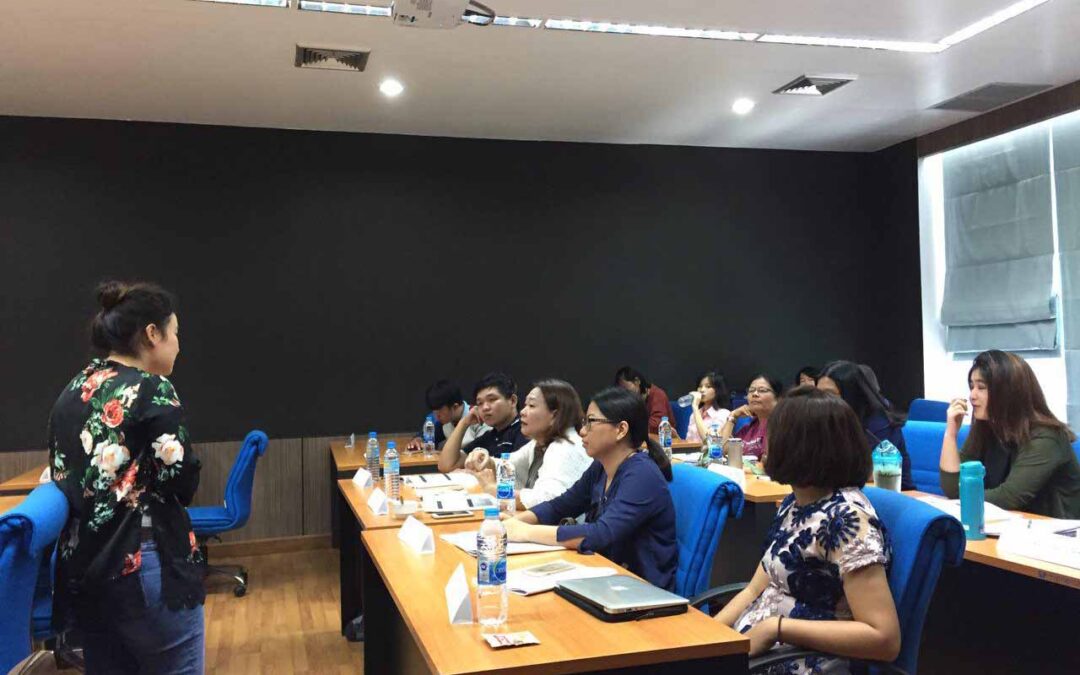
Jul 31, 2017 | News
On 29-31 July 2017, the ICJ, in collaboration with Chiang Mai University’s Faculty of Law, held a workshop on “Introduction to Business and Human Rights & Basic Principles on Documenting Human Rights Violations” for 25 academics, NGO representatives and lawyers in Chiang Mai.
The objective of the workshop, held at the Chiang Mai University campus, was to provide an overview of the field of business and human rights, including the UN Guiding Principles on Business and Human Rights and its “Protect, Respect and Remedy” framework, which Thailand affirmed its commitment to on 31 May 2017, and the need for a binding treaty on business and human rights.
Day 1 focused on the UN framework as it applies to business and human rights, investment law, and strategic litigation.
Day 2 focused on criminal and civil litigation, women’s rights and business, children’s rights and business, and land rights.
Day 3 focused on the basic principles that apply to documenting and reporting on human rights violations.
The speakers at the workshop were:
- Daniel Aguirre, ICJ International Legal Adviser, Myanmar
- Irene Pietropaoli, Expert consultant on business and human rights
- Sanhawan Srisod, ICJ Associate National Legal Adviser, Thailand
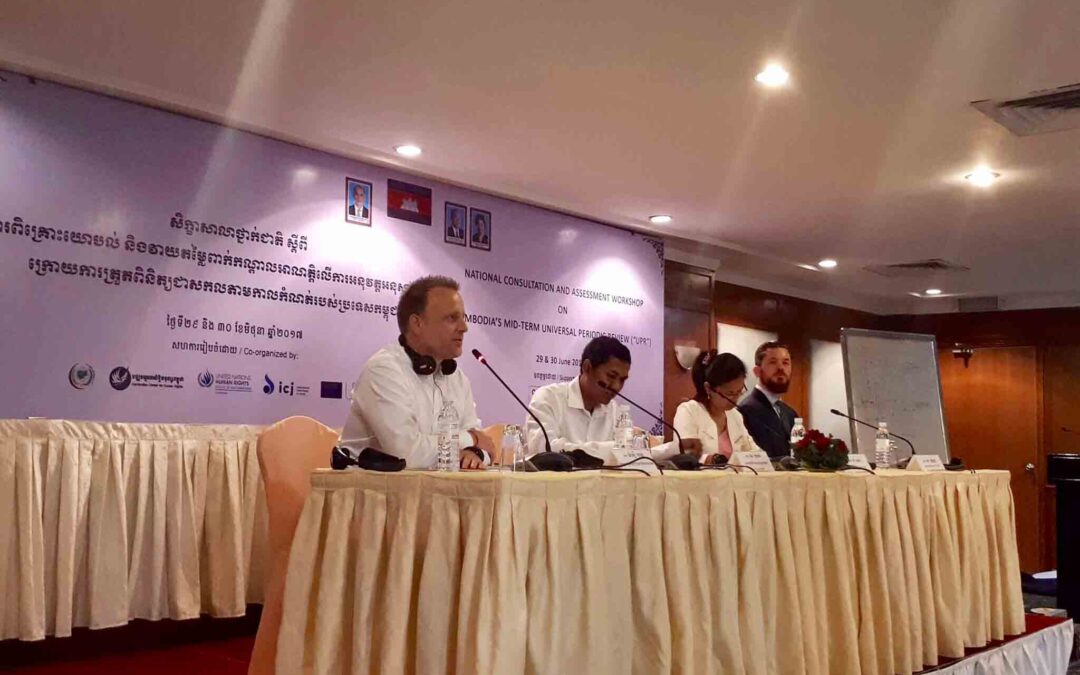
Jun 30, 2017 | News
On 29 and 30 June, the ICJ co-organized a workshop for Cambodian civil society on the UPR.
The workshop was organized with the Cambodian Center for Human Rights, the Cambodia Country Office of the Office of the High Commissioner for Human Rights, UPR Info, and the Cambodian Human Rights Committee on the mid-point review of the Human Rights Council’s (HRC) Universal Review (UPR) of Cambodia.
The Royal Government of Cambodia (RGC) underwent its second UPR in January 2014.
The objectives of the workshop were to:
1. conduct a comprehensive mid-term assessment of the progress and challenges as of late June 2017 of the RGC’s implementation of those recommendations made during the second UPR cycle of Cambodia that the RGC had accepted with a view to informing advocacy around the September 2017 session of the HRC;
2. To take stock of the situation of UPR implementation to provide a basis for preparation of NGO shadow reports during the 3rd cycle of the UPR;
3. To discuss a specific set of UPR recommendations among relevant government bodies and civil society organizations in order to build relationships and raise awareness of the recommendations;
4. To advocate for the full implementation of the recommendations accepted during the second UPR cycle of Cambodia; and
5. To increase awareness of and demand among the Cambodian public for the implementation of the accepted UPR recommendations and to increase awareness of the HRC and UPR process.
Kingsley Abbott, Senior International Legal Adviser for Southeast Asia for the ICJ, moderated a panel discussion on “developing strategic advocacy plans for monitoring the implementation of UPR recommendations” and delivered a presentation on “strategies to effectively implement recommendations and lessons learned from other countries” focusing on past UPR cycles of Thailand Lao PDR.
After a comprehensive review of the recommendations accepted by the RGC during the last UPR cycle it was determined that many of the recommendations had not been implemented.
Civil society agreed that it was important to further strengthen coordinated efforts to monitor and conduct advocacy around the UPR process, engage constructively with the RGC, and begin preparation for the third UPR cycle focusing on lessons learned from the last cycle and regional experiences.
Contact
Kingsley Abbott, ICJ Senior International Legal Adviser for Southeast Asia, t: +66 94 470 1345 ; e: kingsley.abbott(a)icj.org
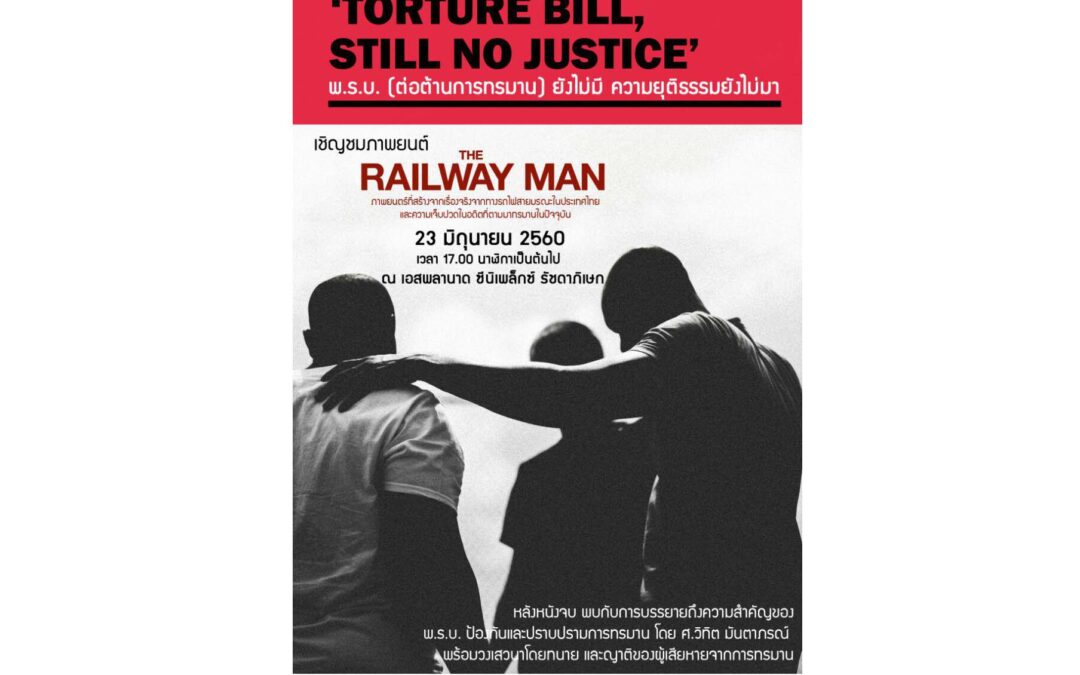
Jun 23, 2017 | News
Today, the ICJ co-hosted an event in Bangkok, Thailand, named “Torture Bill, Still No Justice” to commemorate International Day in Support of Victims of Torture.
The event began with a keynote address by Professor Vitit Muntarbhorn, Special Rapporteur on violence and discrimination based on sexual orientation and gender identity and former ICJ Commissioner.
Following a screening of the film “The Railway Man”, the ICJ moderated a panel discussion which included victims of torture.
The event focused on the decision in February this year of Thailand’s National Legislative Assembly (NLA) to further delay the passage of essential legislation criminalizing torture and enforced disappearance.
Thailand is a State party to the International Covenant on Civil and Political Rights (ICCPR), the Convention against Torture and other Cruel, Inhuman or Degrading Treatment or Punishment (CAT), and has signed, but not yet ratified, the International Convention for the Protection of All Persons from Enforced Disappearance (ICPPED).
The other organizers of the event were the Southeast Asia Regional Office of the Office of the High Commissioner for Human Rights, Amnesty International Thailand, the Cross-Cultural Foundation (CrCF), the Association for the Prevention of Torture (APT) and the Canadian Embassy in Bangkok.
A comic in English and Thai named “Torture is a Crime” was produced especially for the event by Shazeera Zawawi of APT.
Contact
Kingsley Abbott, ICJ Senior International Legal Adviser for Southeast Asia, t: +66 94 470 1345 ; e: kingsley.abbott(a)icj.org
Thailand-Comic-Torture is A Crime-Advocacy-2017-ENG (English version of the comic, PDF)
Thai version here
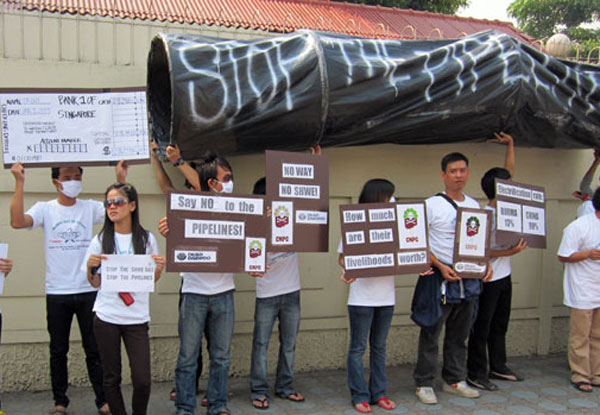
May 30, 2017 | News, Op-eds
An opinion piece by Sean Bain, ICJ legal consultant in Myanmar, and Vicky Bowman, Director of the Myanmar Centre for Responsible Business.
A strategic environmental assessment is needed to enable sustainable development and the fulfilment of human rights for the people of Kyaukphyu, the site of a planned SEZ and deep-sea port.
In its interim report released in March, the Advisory Commission on Rakhine State chaired by former United Nations secretary-general Kofi Annan, called for a comprehensive assessment of the special economic zone in Kyaukphyu Township.
The aim would be to “explore how the SEZ may affect local communities and map how other economic sectors in the state may benefit (or possibly suffer) from the SEZ”.
The State Counsellor’s Office endorsed the commission’s interim recommendations, including for this assessment.
The call for a comprehensive assessment in Kyaukphyu echoes a proposal from our organisations, the Myanmar Centre for Responsible Business and the International Commission of Jurists, for the government to undertake a strategic environmental assessment.
Its purpose would be to address concerns about human rights and to consider the cumulative environmental and social impacts of planned developments. Oxfam has put forward a similar recommendation to the government.
Our recommendation comes as media reports this month suggest that the government is giving renewed attention to the future of the SEZ and related projects in Kyaukphyu.
The SEZ, which has been planned to include industrial parks along with deep-sea ports and transport links to China, would transform the demographic and economic character of Rakhine State’s central coast and hinterlands.
It would have significant impacts for local communities and the state economy, both during and beyond the envisaged 20-year construction period.
Kyaukphyu – already the starting point for oil and gas pipelines to China – would host the largest development project ever undertaken in Rakhine State.
Financed mostly by Chinese investors, with shipping facilities linking Myanmar to international routes through the Bay of Bengal, the project also has national and regional economic significance.
However, to date there has been insufficient consideration of the impacts, either positive or negative, on the livelihoods and human rights of residents and the economy of Rakhine State.
Plans for the SEZ are ambitious yet detailed information is scarce and so far there has been no genuine public participation in planning processes.
While contracts and payments regarding investments are decided in Myanmar’s economic and political capitals, it is at the local level that negative impacts can be felt the most.
It is also at the local level where economic benefits may be enhanced.
To address negative impacts and enable benefits, a joined-up approach that brings together national and local government and local and foreign companies with the people of the area is needed.
At present, a lack of coordination across ministries, and between national and regional governments is limiting the scope to harness opportunities and manage impacts of investments.
Despite their significance, neither the SEZ and deep-sea ports nor the offshore gas projects serviced from Kyaukphyu are included in Rakhine State’s socioeconomic development plan.
We believe a strategic environmental assessment is needed to enable sustainable development and the fulfilment of human rights in the Kyaukphyu area.
Strategic environmental assessments, which are part of Myanmar law, are defined in the 2015 Environmental Impact Procedure as “a range of analytical and participatory approaches that aim to integrate environment into policies, plans and programs and evaluate the inter-linkages with economic and social considerations.
The principle is to integrate environment, alongside economic and social concerns, into a holistic sustainability assessment.”
Unlike an environmental impact assessment, which is a permitting requirement for individual projects, a strategic environmental assessment takes a holistic approach by integrating environmental and social concerns and human rights protection, to produce a big picture view of the impacts of interrelated projects.
At Kyaukphyu, the national and state governments – drawing on financial and technical assistance from development and human rights partners – could commission expert independent consultants to undertake the necessary studies and analysis to produce such an assessment.
The assessment would consider the cumulative human rights and environmental impacts of the SEZ, seaports, pipelines, offshore gas developments and transport and energy infrastructure, including impacts on traditional fishing and farming livelihoods in Kyaukphyu.
It could address how best to avoid or minimise the physical and economic displacement of residents, and how to reduce the potential for local tensions and conflict associated with expected socioeconomic transformations.
A legal framework – based on international law and standards – for protecting human rights during economic displacement and resettlement needs to be put in place. That’s not just for the SEZs, but for all projects.
While insufficient to address the lack of legal accountability in the SEZ Law and the limited access to justice in Myanmar, a strategic environmental assessment could improve transparency and give voice to the views of local communities, businesses, civil society organisations and other stakeholders.
This would help fill major gaps in planning and decision-making processes thus far.
Consultation is critical to the value and legitimacy of any assessment but too often it is tokenistic or minimised to cut costs and time.
Development partners should ensure that they are funding genuine and extensive public participation.
A lesson from Myanmar’s only other assessment of this kind, currently underway with support from the International Finance Corporation focused on the hydropower sector, has been the need to communicate and engage constantly about the purpose and process of the assessment.
Many civil society groups chose not to participate in consultations for the IFC-backed assessment due to scepticism and lack of confidence in the process.
To learn from this experience, international and local NGOs in Kyaukphyu could share information and support communities to make informed decisions about their engagement with a strategic environmental assessment.
Until there is a concrete and transparent plan to manage impacts from development projects in Kyaukphyu, particularly those with negative impacts on human rights, current preparations for the SEZ should be put on hold.
This includes land acquisition that is underway and risks violating the rights of local residents.
The government should also delay entering into investment agreements with the winning consortium of developers, which is led by China’s CITIC Group, until there has been broader multi-stakeholder debate about the SEZ, and how it may develop and interact with other investments in the area.
A strategic environmental assessment in Kyaukphyu could contribute towards correcting a development process that has so far not contributed meaningfully to the realisation of human rights or addressed the economic needs of the population in Kyaukphyu or Rakhine State.
We hope that the Myanmar government at national and state level as well as development partners will take this forward, building on the advisory commission’s recommendation and its endorsement by the state counsellor.
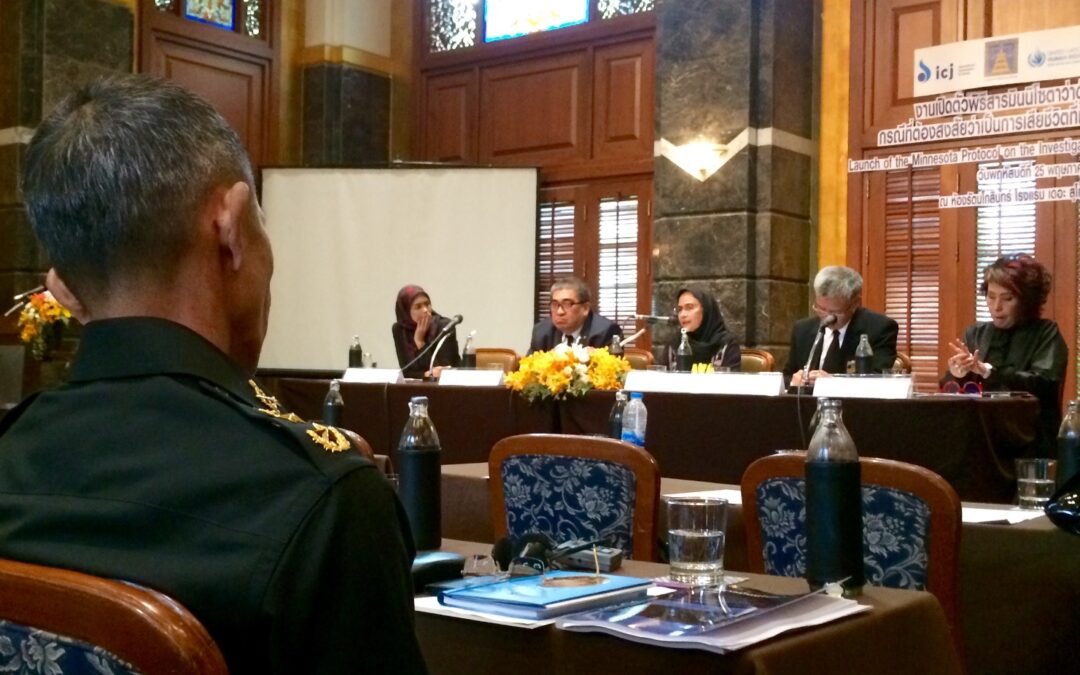
May 26, 2017 | News
The ICJ has launched the revised Minnesota Protocol on the Investigation of Potentially Unlawful Death (2016) in Thailand, together with the Thai Ministry of Justice, the Office of the High Commissioner for Human Rights and the German Embassy in Bangkok.
The launch on Thursday coincided with a parallel launch of the revised Minnesota Protocol by the Office of the High Commissioner for Human Rights in Geneva.
The Minnesota Protocol is a companion document to the UN Principles on the Effective Prevention and Investigation of Extra-legal, Arbitrary and Summary Executions (1989), and sets a common standard of performance in investigating potentially unlawful death and a shared set of principles and guidelines for States, as well as for institutions and individuals who play a role in death investigations.
The launch was attended by representatives of the Ministry of Justice, Ministry of Foreign Affairs, the Royal Thai Police, the Office of the Attorney General, the Ministry of Defence, and the National Human Rights Commission of Thailand.
Kingsley Abbott, ICJ Senior International Legal Adviser for Southeast Asia and member of the Forensics and Legal Working Groups which assisted with the revision the Minnesota Protocol, opened the event for the ICJ by commending Thailand for hosting the first national launch of the revised Minnesota Protocol.
“Investigations play a key role in accountability by upholding the right to life which is guaranteed by Article 6 of the International Covenant on Civil and Political Rights, to which Thailand is a State Party,” said Abbott. “All over the world we witness impunity in cases of unlawful death because either investigations do not take place or are inadequate and non-compliant with international law and standards.”
“The Minnesota Protocol makes it clear that investigations must be prompt, effective and thorough, as well as independent, impartial and transparent, and we expect that the revised Minnesota Protocol will help Thailand and other States to meet that obligation,” added Abbott. “The ICJ wishes to take this opportunity to reaffirm our long-standing commitment to the Thai authorities to assist them in efforts to implement Thailand’s international human rights obligations.”
The other speakers at the launch were:
- Ms Pitikarn Sitthidech, Director General, Rights and Liberties Protection Department, Ministry of Justice
- Ms Katia Chirizzi, Deputy Head, Office of the High Commissioner for Human Rights (OHCHR), Regional Office for Southeast Asia
- Prof. Stuart Casey-Maslen, Project Manager of the revision of the Minnesota Protocol, University of Pretoria
- Dr Pornthip Rojanasunan, Adviser, Central Institute for Forensic Science (CIFC) and member of the Expert Advisory Panel of the revision of the Minnesota Protocol
- Ms Angkhana Neelapaijit, Commissioner, National Human Rights Commission of Thailand and Victim Representative
- Mr Kittinan Thatpramuk, Deputy Director General, Department of Investigation, Office of the Attorney General
- Pol.Lt.Col. Payao Thongsen, Commander, the Special Criminal Cases Office 1, Department of Special Investigation (DSI)
Contact
Kingsley Abbott, ICJ Senior International Legal Adviser for Southeast Asia, t: +66 94 470 1345; e: kingsley.abbott(a)icj.org
Universal-Minnesota Protocol-Advocacy-2017-ENG (PDF, English)
Universal-Minnesota-Protocol-Advocacy-2017-THA (PDF, Thai)
Universal-Minnesota Protocol-Advocacy-2017-BUR (PDF, Burmese)










